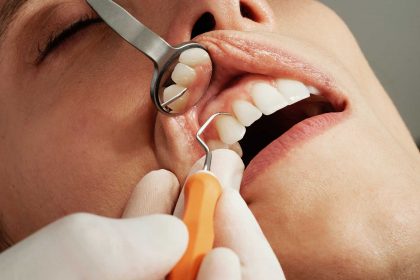When we think of the consequences of poor oral hygiene, mostly what comes to mind are cavities and bad breath — or at the more extreme end, root canals and periodontitis. But there’s growing evidence that dental problems can have an impact far beyond the mouth.
Poor oral hygiene leads to poor oral health, and poor oral health has been linked to many chronic, systemic diseases. These include diabetes, hypertension, heart disease, cancer, stroke, rheumathoid arthritis, autoimmune diseases, respiratory infections, dementia, infertility, kidney disease, and even erectile dysfunction.
That’s a long list. The linkage can sometimes go in just one direction — oral health contributes to a condition, but that condition does not affect oral health, for example — and sometimes it goes both ways, such as certain autoimmune diseases that are influenced by poor oral health while simultaneously contributing to poor oral health. It can be a vicious circle of side effects.
Which diseases are linked to oral health?
Within the mouth itself, dental caries (or cavities) are the most obvious problem. Then there’s gum disease, characterized by inflammation and infection. But this article is more interested in the systemic diseases that occur away from the mouth.
Systemic diseases linked to poor oral health
How the different conditions listed below are linked to poor oral health is not always known, but a common suspicion is that infections in the mouth pass bacteria into the bloodstream. This bacteria then causes problems elsewhere. This is an oversimplification, of course, and likely not the pattern in every case. But it’s a starting point for understanding.
Diabetes
There’s an obvious link from diabetes to poor oral health. High sugar levels in the blood lead to higher sugar levels in the saliva, which then feeds the bacteria responsible for cavities and gum disease. But there is also evidence that periodontitis or inflammation in the mouth can weaken the body’s ability to maintain control over blood sugar, making this a two-way linkage between diabetes and oral health. Treating periodontitis has been shown to help with control of diabetes.
Hypertension
Hypertension or high blood pressure has been shown to worsen among people with poor oral health, specifically periodontitis. Studies have also shown that people taking medication for high blood pressure benefit more from their treatment when their oral health is good.
Heart disease
A number of studies have shown a connection between oral health and heart disease, although one large recent study called this into question by noting that the actual correlation is between smoking and heart disease, with poor oral health being an additional side effect of the smoking. There will surely be more studies to come.
Cancer
Smoking is another big culprit when it comes to cancer — oral cancers included — but even with smoking excluded as a factor, people with poor oral health are 56% more susceptible to the HPV virus, which can cause mouth and throat cancers.
Stroke
A U.K. study recently showed that people with gum disease are twice as likely to have a stroke as those in good oral health. This is in addition to studies from Germany, France, Korea, India, and Sweden linking stroke with periodontal disease. Even mild gingivitis shows a correlation with stroke risk. And people who have lost teeth have an increased likelihood of “silent strokes,” which are strokes they aren’t even aware they’ve had. Multiple silent strokes can eventually lead to dementia.
Rheumatoid arthritis
There is a significant association between periodontitis and rheumatoid arthritis, an autoimmune disease. And while causes and mechanisms will require much more study to understand, it seems that this is one that can go both ways: poor oral health can worsen RA, and RA can worsen oral health.
Other autoimmune diseases
In addition to RA and diabetes, autoimmune diseases that may be exacerbated by poor oral health include ulcerative colitis and Chron’s disease. Autoimmune diseases that can have a significant impact on oral health include Sjogren’s syndrome, Chrone’s, Hashimoto’s, and lupus.
Respiratory infections
It’s a short trip from the mouth to the lungs, and bad bacteria that have taken up residence in your mouth don’t hesitate to make the leap. The result can be bronchitis, pneumonia, emphysema, and chronic obstructive pulmonary disease. None of that is fun.
Dementia
We’ve already discussed the link between oral health, stroke, and dementia, but bacteria related to gum disease have also been shown to be directly associated with vascular dementia. And a recent examination of a long-term CDC survey of health statistics indicates that Alzheimer’s in adults over 65 is associated with having mouth infections before developing the disease — suggesting that the infections were not a side effect of dementia-related neglect, but possibly a related precursor.
Infertility
Both male and female fertility have been shown to be negatively affected by poor dental health. Poor oral health reduces sperm count — and their ability to swim — and triples the risk of infertility for women.
Kidney disease
Cavities and gum disease are bacterial infections that can trigger chronic inflammation, which can cause problems for people with immune systems weakened by kidney disease. And coming at it from the other direction, kidney disease increases the risk of periodontal disease, tooth loss, and bad breath. Medications prescribed for kidney disease can also dry the mouth, increasing the risk of cavities.
Erectile dysfunction
Men with periodontitis are nearly three times as likely as other men to experience erectile dysfunction. It’s not certain whether poor oral health causes ED, but poor oral health is often a sign that erectile dysfunction is soon to follow.
REFERENCE
NIH: https://www.nidcr.nih.gov/health-info/diabetes
AHA: https://www.ahajournals.org/doi/10.1161/HYPERTENSIONAHA.118.11528
Harvard Health: https://www.health.harvard.edu/diseases-and-conditions/gum-disease-and-the-connection-to-heart-disease
NRAS: https://nras.org.uk/resource/gum-disease/
BioMed: https://arthritis-research.biomedcentral.com/articles/10.1186/s13075-019-1808-z
NIH: https://pubmed.ncbi.nlm.nih.gov/12034069/
NIH: https://www.nia.nih.gov/news/large-study-links-gum-disease-dementia




